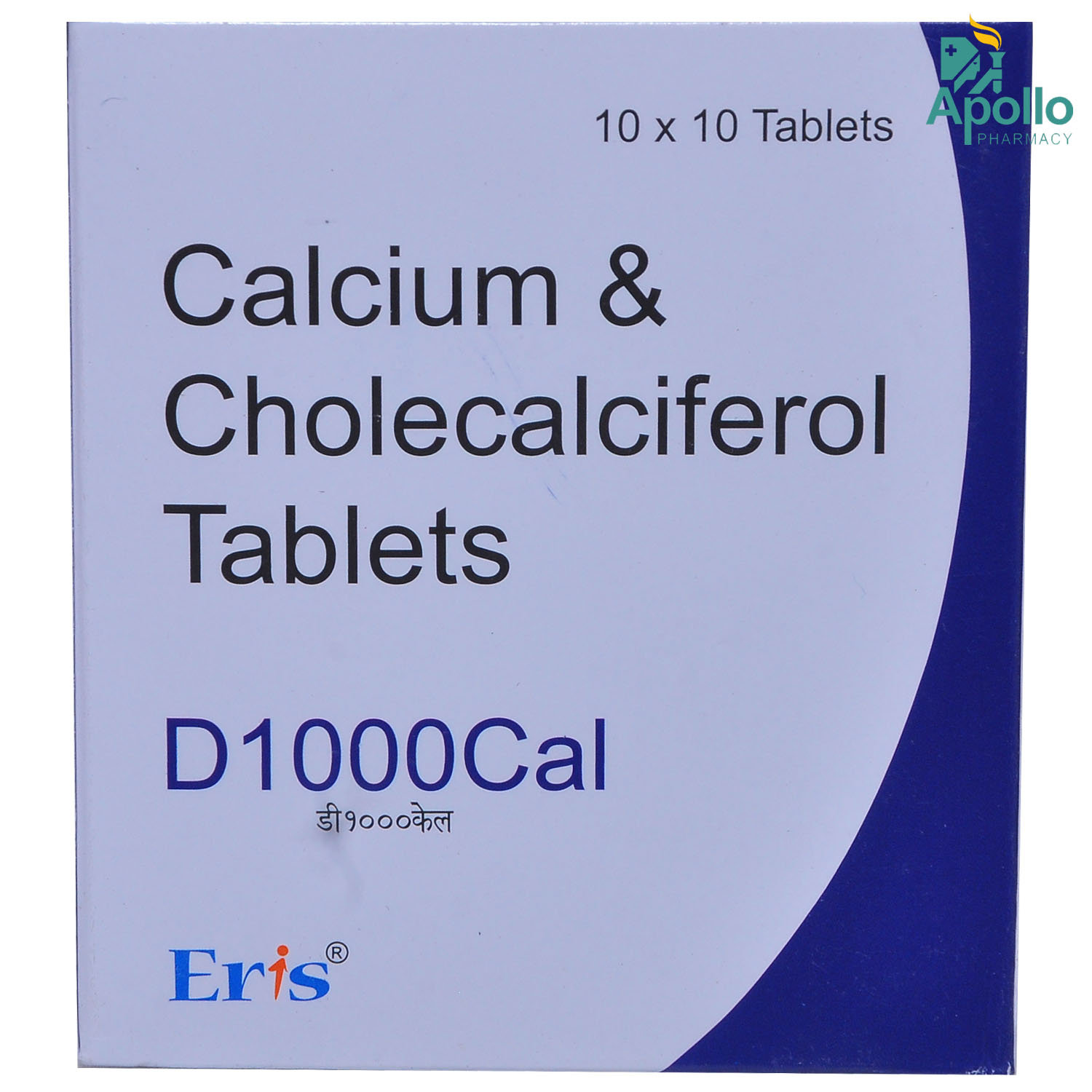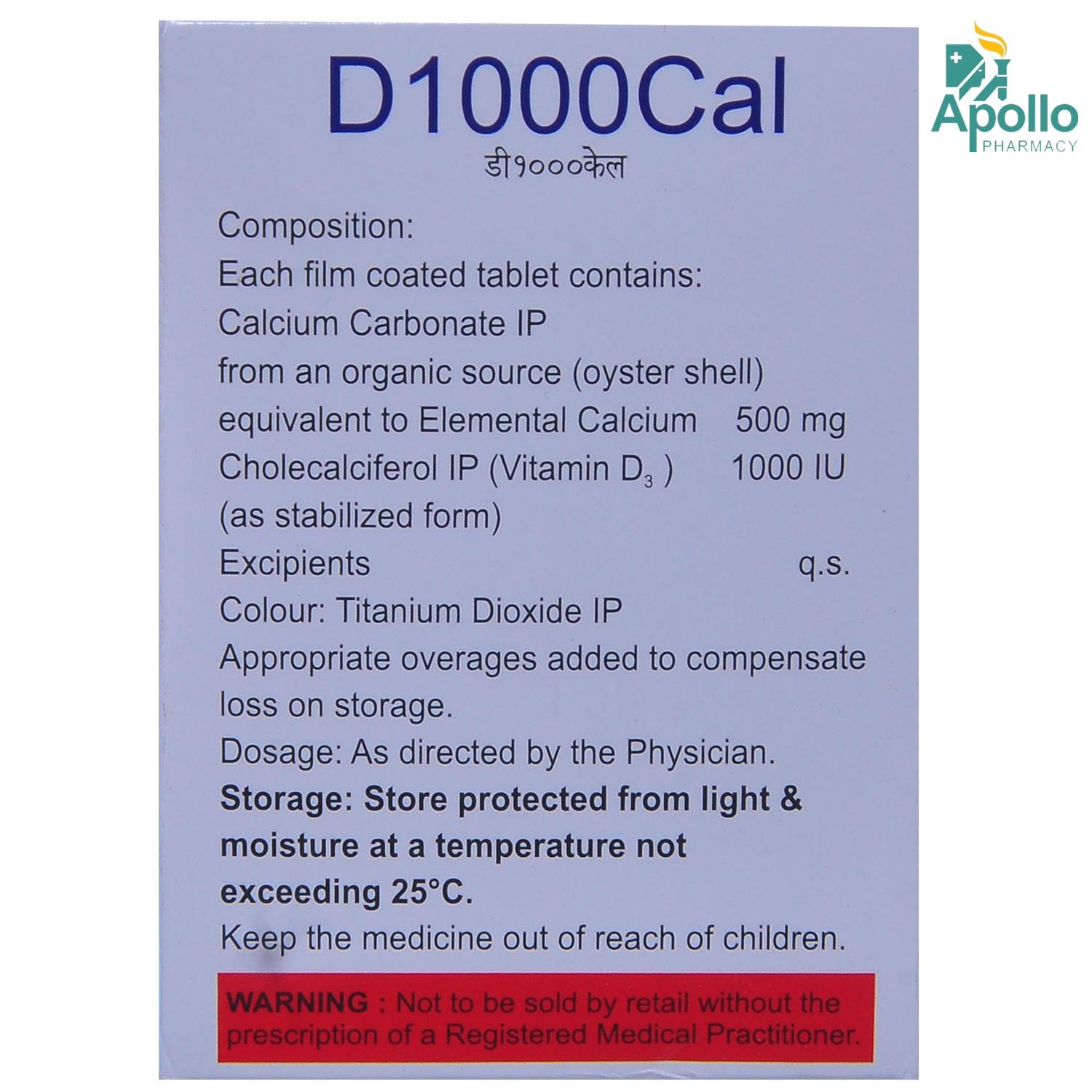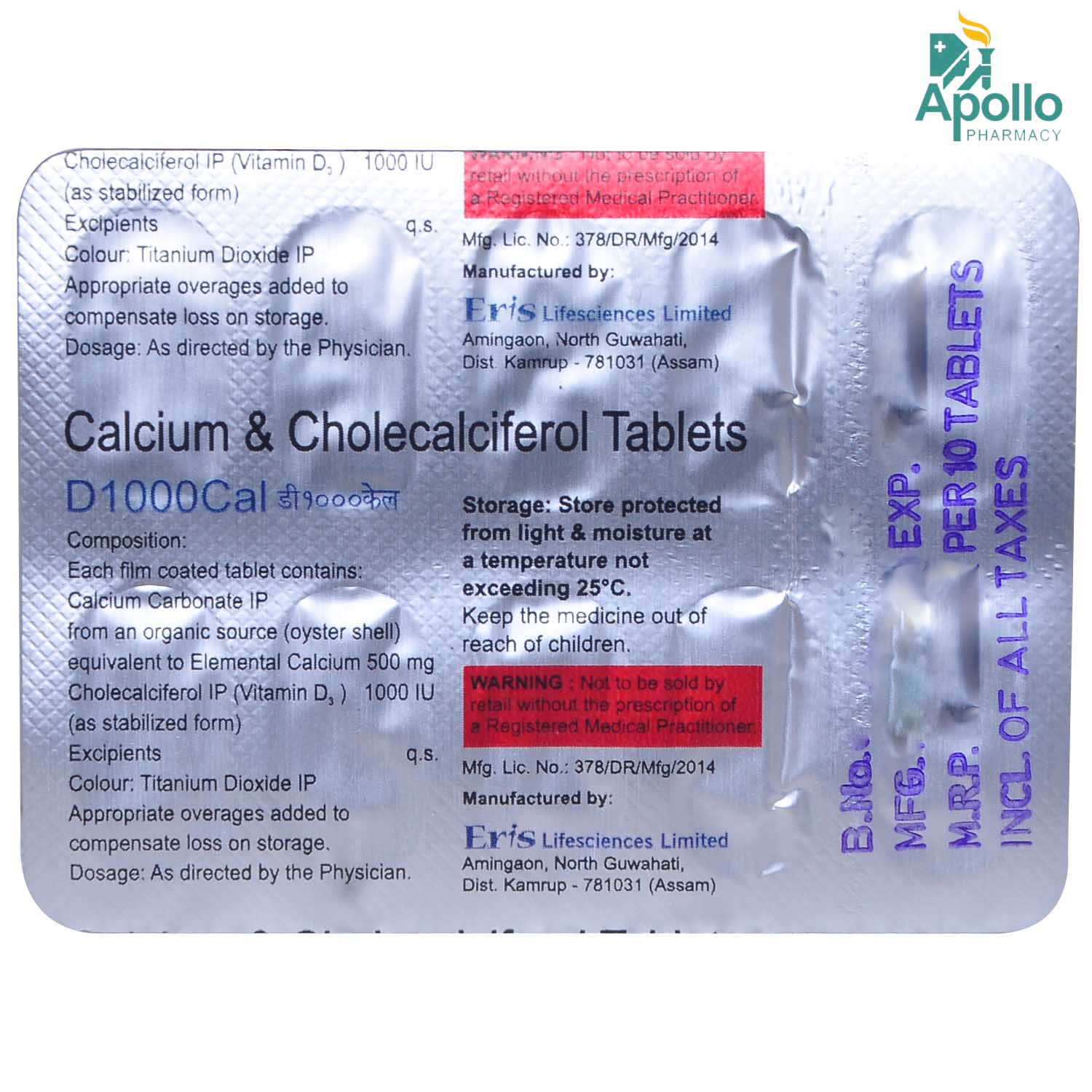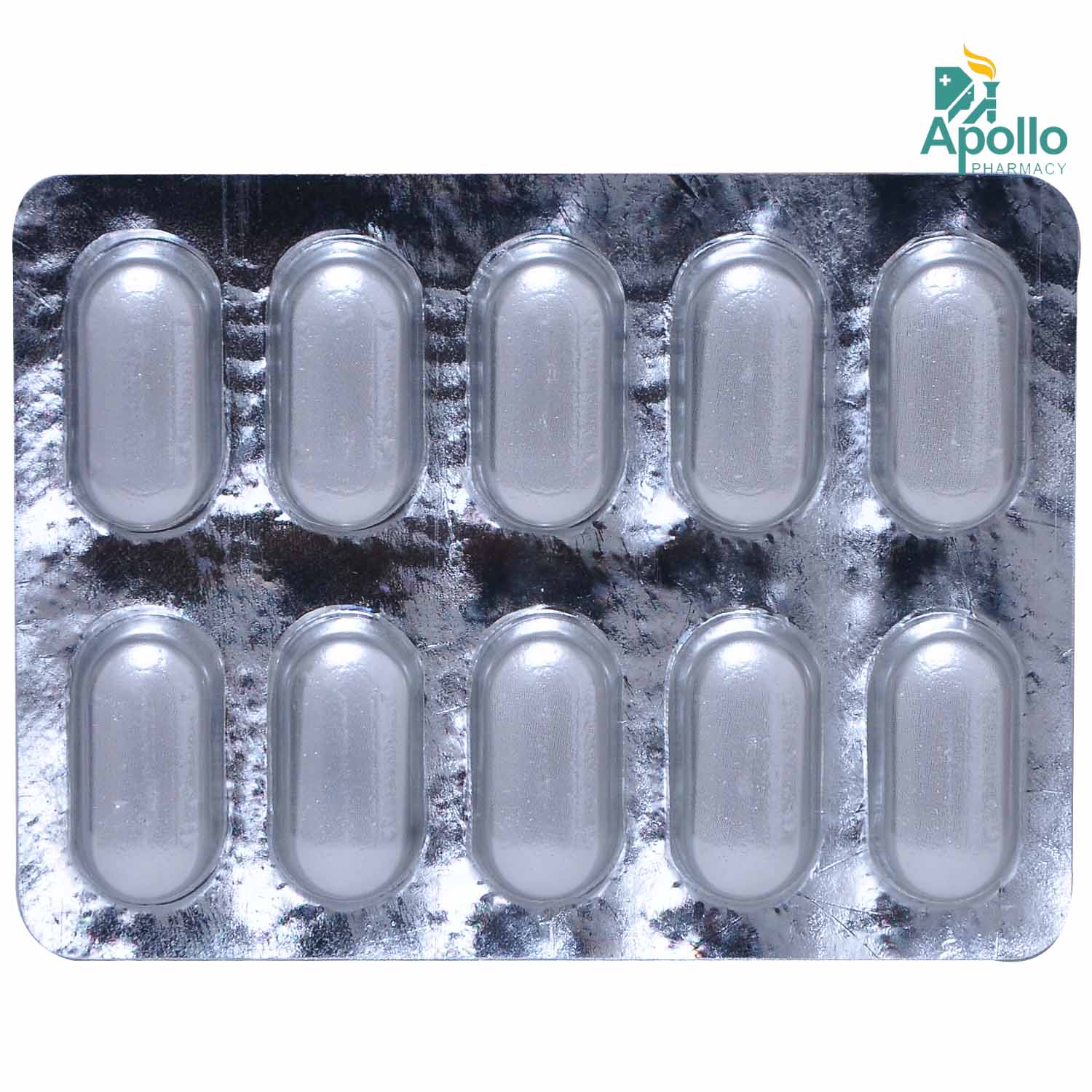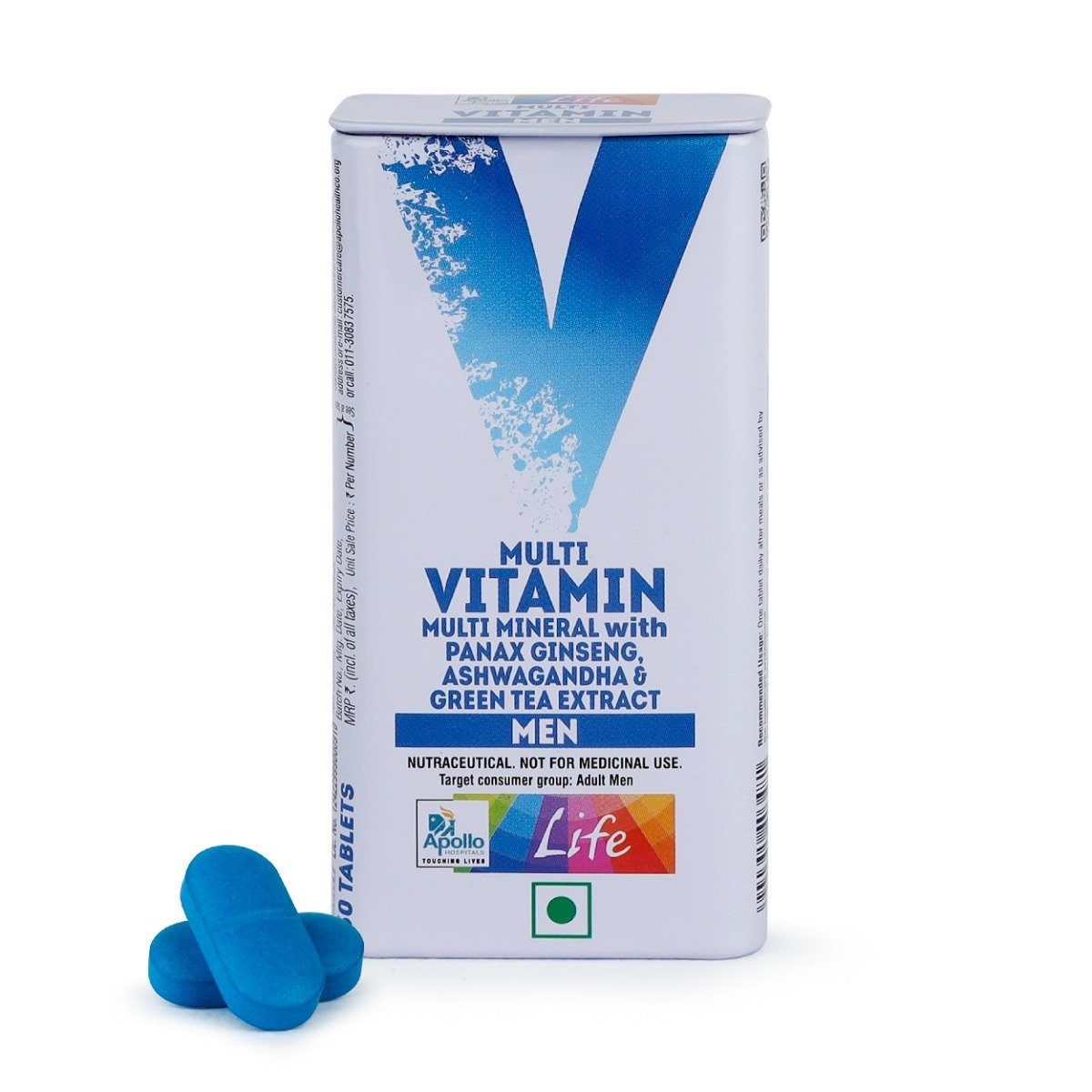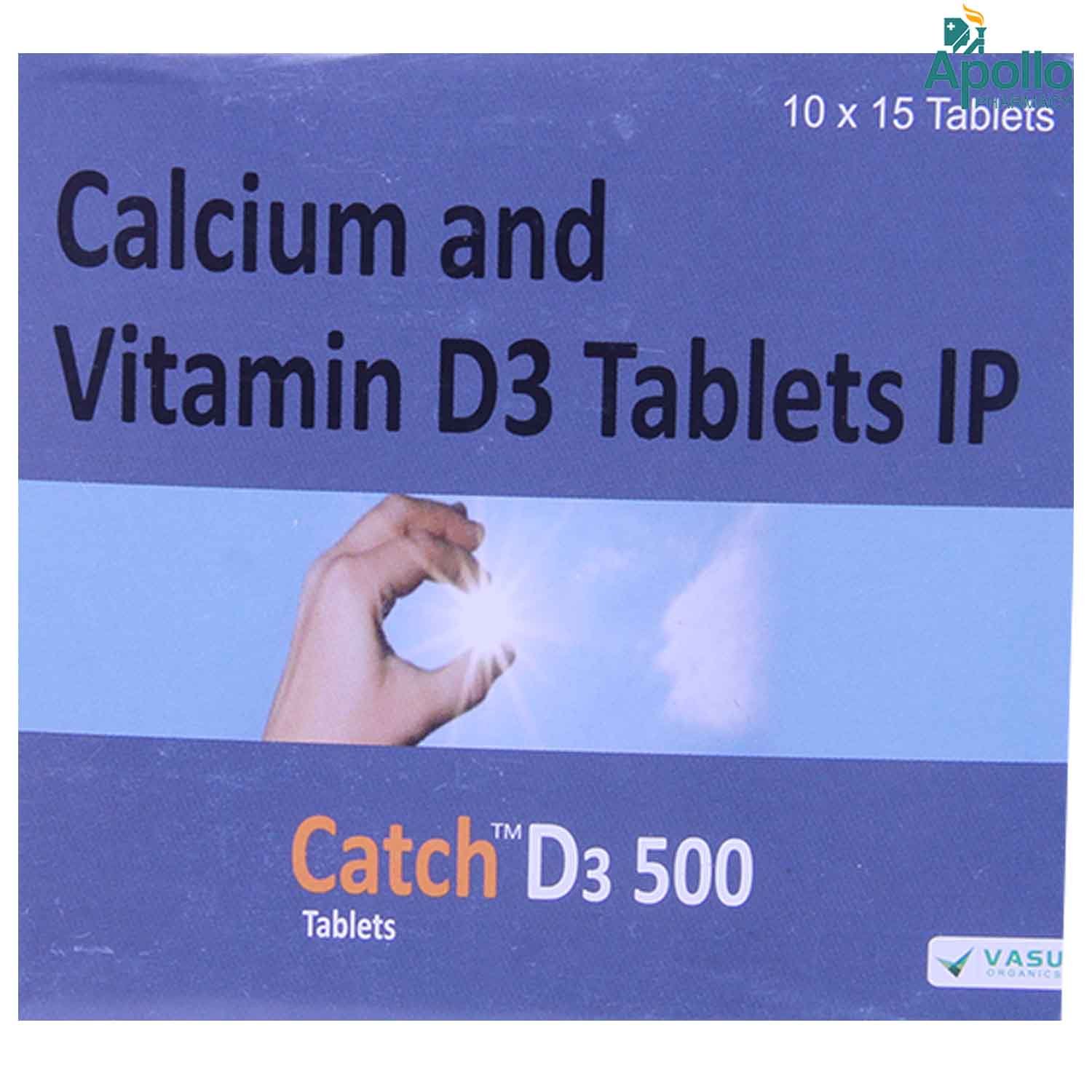D 1000 Cal Tablet 10's
MRP ₹76.5
(Inclusive of all Taxes)
₹11.5 Cashback (15%)
About D 1000 Cal Tablet
D 1000 Cal Tablet belongs to the class of ‘Multi-minerals’ primarily used to treat low blood calcium levels. D 1000 Cal Tablet effectively treats various conditions caused by low calcium levels in the body, such as osteoporosis (weak and brittle bones), osteomalacia/rickets (weak bones), hypoparathyroidism (low levels of parathyroid hormone) and latent tetany (a muscle disease with low blood calcium levels). D 1000 Cal Tablet can also be given to pregnant, nursing, and postmenopausal women to ensure that they are getting enough calcium.
D 1000 Cal Tablet consists of two medicines, namely: Calcium carbonate(mineral) and Cholecalciferol(Vitamin D3). Calcium carbonate is a mineral that is used to prevent or treat a calcium deficiency. It provides essential nutrients to maintain bone formation and maintenance. Cholecalciferol(Vitamin D3) is used in the absorption of calcium in the blood. Which helps in the processing of essential minerals in the body like Calcium and Phosphorus. Lack of Vitamin D3 results in bone weakening, bone pain, and skin diseases.
Take D 1000 Cal Tablet as prescribed by your doctor. You are advised to take D 1000 Cal Tablet for as long as your doctor has prescribed it for you depending on your medical condition. In some cases, D 1000 Cal Tablet can cause side effects like constipation or stomach upset, nausea, vomiting, loss of appetite, mood changes, weakness, tiredness, fast or pounding heartbeat, bone/muscle pain, and headache. Most of these side effects of D 1000 Cal Tablet do not require medical attention and gradually resolve over time. However, if these side effects persist longer, please consult your doctor.
If you are known to be allergic to D 1000 Cal Tablet or its inactive components, please inform your doctor. Pregnant or breastfeeding women should consult their doctor before taking D 1000 Cal Tablet . Higher doses of Vitamin D than the recommended daily dose should be used in pregnant women only when advised by the doctor. D 1000 Cal Tablet may pass into the breast milk, hence breastfeeding mothers need to seek medical advice before starting D 1000 Cal Tablet . Do not take D 1000 Cal Tablet if you have hypercalcemia (high calcium levels), hypervitaminosis D (high vitamin D levels), and malabsorption syndrome (difficulty absorbing nutrition from food).
Country of origin
Manufacturer/Marketer address
Online payment accepted

secured payment

india's most trusted pharmacy

genuine products
Composition :
Manufacturer/Marketer :
Consume Type :
Expires on or after :
Return Policy :
Provide Delivery Location
About D 1000 Cal Tablet
D 1000 Cal Tablet belongs to the class of ‘Multi-minerals’ primarily used to treat low blood calcium levels. D 1000 Cal Tablet effectively treats various conditions caused by low calcium levels in the body, such as osteoporosis (weak and brittle bones), osteomalacia/rickets (weak bones), hypoparathyroidism (low levels of parathyroid hormone) and latent tetany (a muscle disease with low blood calcium levels). D 1000 Cal Tablet can also be given to pregnant, nursing, and postmenopausal women to ensure that they are getting enough calcium.
D 1000 Cal Tablet consists of two medicines, namely: Calcium carbonate(mineral) and Cholecalciferol(Vitamin D3). Calcium carbonate is a mineral that is used to prevent or treat a calcium deficiency. It provides essential nutrients to maintain bone formation and maintenance. Cholecalciferol(Vitamin D3) is used in the absorption of calcium in the blood. Which helps in the processing of essential minerals in the body like Calcium and Phosphorus. Lack of Vitamin D3 results in bone weakening, bone pain, and skin diseases.
Take D 1000 Cal Tablet as prescribed by your doctor. You are advised to take D 1000 Cal Tablet for as long as your doctor has prescribed it for you depending on your medical condition. In some cases, D 1000 Cal Tablet can cause side effects like constipation or stomach upset, nausea, vomiting, loss of appetite, mood changes, weakness, tiredness, fast or pounding heartbeat, bone/muscle pain, and headache. Most of these side effects of D 1000 Cal Tablet do not require medical attention and gradually resolve over time. However, if these side effects persist longer, please consult your doctor.
If you are known to be allergic to D 1000 Cal Tablet or its inactive components, please inform your doctor. Pregnant or breastfeeding women should consult their doctor before taking D 1000 Cal Tablet . Higher doses of Vitamin D than the recommended daily dose should be used in pregnant women only when advised by the doctor. D 1000 Cal Tablet may pass into the breast milk, hence breastfeeding mothers need to seek medical advice before starting D 1000 Cal Tablet . Do not take D 1000 Cal Tablet if you have hypercalcemia (high calcium levels), hypervitaminosis D (high vitamin D levels), and malabsorption syndrome (difficulty absorbing nutrition from food).
Uses of D 1000 Cal Tablet
Key Benefits
D 1000 Cal Tablet is a combination of three drugs, namely; Calcium carbonate(mineral), Cholecalciferol(Vitamin D3) used to treat low blood calcium levels and various associated conditions caused by low calcium levels in the body, such as osteoporosis (weak and brittle bones), osteomalacia/rickets (weak bones), hypoparathyroidism (low levels of parathyroid hormone) and tetany (a muscle disease with low blood calcium levels). Calcium carbonate is a mineral and prevents or treats calcium deficiency. It helps to maintain bone and teeth health. Cholecalciferol(Vitamin D3) treats calcium deficiency with hypoparathyroidism (the parathyroid glands' decreased activity) and metabolic bone diseases in people with chronic kidney failure.
Directions for Use
Storage
Side Effects of D 1000 Cal Tablet
- Nausea
- Vomiting
- Headache
- Stomach pain
- Loss of appetite
- Constipation
- Mood changes
- Tiredness/ weakness
- Bone/muscle pain
- Fast or pounding heartbeat
Drug Warnings
If you are known to be allergic to D 1000 Cal Tablet or any other medicines, please tell your doctor. If you are pregnant or planning to become pregnant, it is advised to inform your doctor before using D 1000 Cal Tablet . Higher doses of Vitamin D than the recommended daily dose should be used in pregnant women only when advised by the doctor. Cholecalciferol in higher doses may harm the foetus. D 1000 Cal Tablet may pass into the breast milk, hence consult your doctor before taking D 1000 Cal Tablet if you are a breastfeeding mother. D 1000 Cal Tablet should be used with caution in children and only if prescribed by a doctor. Cholecalciferol in D 1000 Cal Tablet can affect growth in children. Inform your doctor if your child is not growing at a normal rate while using D 1000 Cal Tablet . D 1000 Cal Tablet is not recommended if you have hypercalcemia (high calcium levels), metastatic calcification (extra deposits of calcium in the body), hypervitaminosis D (high vitamin D levels), and malabsorption syndrome (difficulty absorbing nutrition from food). Inform your doctor before taking D 1000 Cal Tablet if you have any heart/kidney/liver/blood vessel diseases, kidney stones, sarcoidosis (growth of inflammatory cells in different parts of the body), Crohn's disease (inflammatory bowel disease), Whipple's disease (bacterial infection affecting joints and digestive system), achlorhydria (little or no stomach acid), low levels of bile, and phosphate imbalance. D 1000 Cal Tablet contains sugar or sorbitol; hence caution should be taken to have an intolerance to sugars, diabetes, and phenylketonuria (increased levels of an amino acid called phenylalanine).
Drug Interactions
Drug-Drug Interactions: D 1000 Cal Tablet may interact with calcium supplements (ergocalciferol, calcitriol), drugs treating bone loss (alendronate), diuretics (bendroflumethiazide, chlortalidone, indapamide), a drug used to treat heart disease (digoxin), antacids (magnesium hydroxide), steroid medicines (hydrocortisone, prednisolone, dexamethasone), central nervous system stimulants (dextroamphetamine, amphetamine), anti-depressants (duloxetine), minerals (ferrous sulfate), anti-ulcer drugs (ranitidine), synthetic thyroid hormone (levothyroxine), painkillers (aspirin), anti-clotting drugs (anisindione, dicumarol, warfarin), drugs treating high cholesterol levels (cholestyramine, colesevelam, colestipol), and drugs that treat high blood phosphorus levels (sevelamer), antibiotics (tetracycline, doxycycline, minocycline), quinolone antibiotics (ciprofloxacin, levofloxacin), weight-loss drugs (orlistat), and anti-cancer medication (estramustine).
Drug-Food Interactions: Avoid or reduce the intake of caffeine, soft drinks, and alcohol that inhibit calcium absorption.
Drug-Disease Interactions: D 1000 Cal Tablet is contraindicated in hypercalcemia (high calcium level in blood), hypervitaminosis D (high vitamin D level in the body), Vitamin D toxicity, malabsorption syndrome, heart/kidney/liver/blood vessel diseases, kidney stones, sarcoidosis (growth of tiny collections of inflammatory cells (granulomas) in any part of your body), Crohn's disease, Whipple's disease (a bacterial infection that most often affects joints and digestive system), achlorhydria (absence of stomach acid), low levels of bile, and phosphate imbalance.
Drug-Drug Interactions Checker List
- DOXYCYCLINE
- MINOCYCLINE
- CALCITRIOL
- CIPROFLOXACIN
- LEVOFLOXACIN
- ORLISTAT
- ESTRAMUSTINE
- TETRACYCLINE
- SEVELAMER
- COLESTIPOL
- CHOLESTYRAMINE
- COLESEVELAM
- WARFARIN
- DICUMAROL
- ANISINDIONE
- ASPIRIN
- LEVOTHYROXINE SODIUM
- RANITIDINE
- FERROUS SULPHATE
- DULOXETINE
- AMPHETAMINE
- ERGOCALCIFEROL
- ALENDRONATE SODIUM
- BENDROFLUMETHIAZIDE
- CHLORTALIDONE
- INDAPAMIDE
- MAGNESIUM HYDROXIDE
- DIGOXIN
- DEXTROAMPHETAMINE
- DEXAMETHASONE
- PREDNISOLONE
- HYDROCORTISONE
Habit Forming
Diet & Lifestyle Advise
- Include dairy products like milk, yoghurt, cheese, or milk-based custard in your diet.
- Eat daily a serving of broccoli, cabbage, bok choy, spinach, and other green leafy vegetables.
- Snack on calcium-rich nuts like Brazil nuts or almonds.
- Sprinkle sesame seeds over your food, vegetables, and salads. Sesame seeds are high in calcium.
- Avoid or reduce the intake of caffeine, soft drinks, and alcohol that inhibit calcium absorption.
- Replace the meat with tofu for extra calcium in your food.
Special Advise
- Clinical monitoring of serum electrolyte concentrations and cardiac function is recommended.
- A low phosphate diet is recommended to control serum phosphorus levels in patients undergoing dialysis.
Disease/Condition Glossary
Osteoporosis: It is a bone disease that weakens and brittle bones by decreasing bone density. As bones become less dense, they weaken and are more likely to break. Breaking a bone is a serious complication of osteoporosis, especially with older patients. Women are much more likely to develop osteoporosis than are men. Sign and symptoms include back pain caused by a fractured or collapsed vertebra, loss of height over time, a stooped posture, a bone that breaks much more easily than expected.
Osteomalacia/Rickets: A bone disease caused by softening and weakening bones in children due to inadequate vitamin D. Adults can experience a similar condition known as osteomalacia. It causes bone pain, poor growth, and soft, weak bones that can lead to bone deformities.
Tetany: A disease condition due to low levels of calcium (hypocalcemia) in the body causes cramps and spasms in the hands, feet, and larynx (voice box).
Hypoparathyroidism: It is a disease characterized by low levels of parathyroid hormone. This can cause low calcium levels and trigger tetany.
FAQs
Disclaimer
Alcohol
Safe if prescribed
Drinking alcohol can affect calcium absorption; hence it is advised to limit the alcohol intake while using D 1000 Cal Tablet .
Pregnancy
Consult your doctor
During pregnancy, use higher doses of D 1000 Cal Tablet than the daily dietary allowance only when advised by the doctor. Calcitriol in higher doses may harm the foetus. Your doctor will weigh the potential risks and benefits before prescribing D 1000 Cal Tablet .
Breast Feeding
Consult your doctor
Consult your doctor before taking D 1000 Cal Tablet if you are breastfeeding. D 1000 Cal Tablet can pass into the breast milk. If D 1000 Cal Tablet is used during breastfeeding, please monitor the mother and the infant's serum calcium levels.
Driving
Safe if prescribed
No interaction found/established
Liver
Consult your doctor
Let your doctor know if you have any history of liver diseases before taking D 1000 Cal Tablet . Hepatic impairment/liver disease can alter the metabolic and therapeutic activity of certain Vitamin D forms.
Kidney
Consult your doctor
It is advised to seek doctor advice before starting D 1000 Cal Tablet if you have kidney diseases like kidney stones or undergoing dialysis. Calcitriol in D 1000 Cal Tablet increases inorganic phosphate levels in serum; hence caution should be taken in patients undergoing dialysis to maintain adequate phosphorus levels and avoid ectopic calcification (calcium deposition).
Children
Safe if prescribed
D 1000 Cal Tablet should be used with caution in children and only if prescribed by a doctor.
Uses of D 1000 Cal Tablet
Key Benefits
D 1000 Cal Tablet is a combination of three drugs, namely; Calcium carbonate(mineral), Cholecalciferol(Vitamin D3) used to treat low blood calcium levels and various associated conditions caused by low calcium levels in the body, such as osteoporosis (weak and brittle bones), osteomalacia/rickets (weak bones), hypoparathyroidism (low levels of parathyroid hormone) and tetany (a muscle disease with low blood calcium levels). Calcium carbonate is a mineral and prevents or treats calcium deficiency. It helps to maintain bone and teeth health. Cholecalciferol(Vitamin D3) treats calcium deficiency with hypoparathyroidism (the parathyroid glands' decreased activity) and metabolic bone diseases in people with chronic kidney failure.
Directions for Use
Storage
Drug Warnings
If you are known to be allergic to D 1000 Cal Tablet or any other medicines, please tell your doctor. If you are pregnant or planning to become pregnant, it is advised to inform your doctor before using D 1000 Cal Tablet . Higher doses of Vitamin D than the recommended daily dose should be used in pregnant women only when advised by the doctor. Cholecalciferol in higher doses may harm the foetus. D 1000 Cal Tablet may pass into the breast milk, hence consult your doctor before taking D 1000 Cal Tablet if you are a breastfeeding mother. D 1000 Cal Tablet should be used with caution in children and only if prescribed by a doctor. Cholecalciferol in D 1000 Cal Tablet can affect growth in children. Inform your doctor if your child is not growing at a normal rate while using D 1000 Cal Tablet . D 1000 Cal Tablet is not recommended if you have hypercalcemia (high calcium levels), metastatic calcification (extra deposits of calcium in the body), hypervitaminosis D (high vitamin D levels), and malabsorption syndrome (difficulty absorbing nutrition from food). Inform your doctor before taking D 1000 Cal Tablet if you have any heart/kidney/liver/blood vessel diseases, kidney stones, sarcoidosis (growth of inflammatory cells in different parts of the body), Crohn's disease (inflammatory bowel disease), Whipple's disease (bacterial infection affecting joints and digestive system), achlorhydria (little or no stomach acid), low levels of bile, and phosphate imbalance. D 1000 Cal Tablet contains sugar or sorbitol; hence caution should be taken to have an intolerance to sugars, diabetes, and phenylketonuria (increased levels of an amino acid called phenylalanine).
Therapeutic Class
Drug-Drug Interactions
Drug-Drug Interactions
Login/Sign Up
The combined use of aluminum hydroxide with D 1000 Cal Tablet may increase the risk of toxicity.
How to manage the interaction:
Co-administration of D 1000 Cal Tablet with Aluminium hydroxide can possibly result in an interaction, but it can be taken if your doctor has advised it. If you're having any of these symptoms like bone pain, muscle weakness, anemia, seizures, or dementia, it's important to contact your doctor right away. Do not stop using any medications without a doctor's advice.
The combined use of calcifediol with cholecalciferol can increase the risk of side effects.
How to manage the interaction:
Although there is a possible interaction between D 1000 Cal Tablet and calcifediol, you can take these medicines together if prescribed by your doctor. If you notice any of these symptoms - irregular heartbeat, seizures, weakness, tiredness, headache, dizziness, ringing in the ears, loss of appetite, feeling sick, dry mouth, strange taste in your mouth, muscle or bone pain, thirst, losing weight, eye infection, sensitivity to light, runny nose or itching - contact a doctor right away. Do not discontinue any medications without consulting a doctor.
Cholecalciferol and doxercalciferol are forms of vitamin D, and taking too much vitamin D may lead to toxic effects.
How to manage the interaction:
Although there is a possible interaction between D 1000 Cal Tablet and doxercalciferol, you can take these medicines together if prescribed by your doctor. If you notice any of these symptoms - irregular heartbeat, seizures, weakness, tiredness, headache, dizziness, ringing in the ears, loss of appetite, feeling sick, dry mouth, strange taste in your mouth, muscle or bone pain, thirst, losing weight, eye infection, sensitivity to light, runny nose or itching - make sure to call a doctor right away. Do not discontinue any medications without consulting a doctor.
Co-administration of Cholecalciferol and Calcitriol are forms of vitamin D, and taking too much vitamin D may lead to toxic effects.
How to manage the interaction:
Although there is a possible interaction between D 1000 Cal Tablet and calcitriol, you can take these medicines together if prescribed by your doctor. If you notice any of these symptoms - irregular heartbeat, seizures, weakness, tiredness, headache, dizziness, ringing in the ears, loss of appetite, feeling sick, dry mouth, strange taste in your mouth, muscle or bone pain, thirst, losing weight, eye infection, sensitivity to light, runny nose or itching - contact a doctor right away. Do not discontinue any medications without consulting a doctor.
The combined use of cholecalciferol and paricalcitol are forms of vitamin D, and taking too much vitamin D may lead to toxic effects.
How to manage the interaction:
Although there is a possible interaction between D 1000 Cal Tablet and paricalcitol, you can take these medicines together if prescribed by your doctor. If you notice any of these symptoms - irregular heartbeat, seizures, weakness, tiredness, headache, dizziness, ringing in the ears, loss of appetite, feeling sick, dry mouth, strange taste in your mouth, muscle or bone pain, thirst, losing weight, eye infection, sensitivity to light, runny nose or itching - contact a doctor right away. Do not discontinue any medications without consulting a doctor.
The combined use of cholecalciferol and ergocalciferol are forms of vitamin D, and taking too much vitamin D may lead to toxic effects.
How to manage the interaction:
Although there is a possible interaction between D 1000 Cal Tablet and ergocalciferol, you can take these medicines together if prescribed by your doctor. If you notice any of these symptoms - irregular heartbeat, seizures, weakness, tiredness, headache, dizziness, ringing in the ears, loss of appetite, feeling sick, dry mouth, strange taste in your mouth, muscle or bone pain, thirst, losing weight, eye infection, sensitivity to light, runny nose or itching - contact a doctor right away. Do not discontinue any medications without consulting a doctor.
Taking Cholecalciferol together with Sucralfate may increase the risk or severity of kidney problems.
How to manage the interaction:
There may be a possibility of interaction between Cholecalciferol and Sucralfate, but it can be taken if prescribed by a doctor. Do not discontinue any medications without consulting a doctor.
Cholecalciferol and dihydrotachysterol are forms of vitamin D, and taking too much vitamin D may lead to toxic effects.
How to manage the interaction:
Although there is a possible interaction between D 1000 Cal Tablet and dihydrotachysterol, you can take these medicines together if prescribed by your doctor. If you notice any of these symptoms - irregular heartbeat, seizures, weakness, tiredness, headache, dizziness, ringing in the ears, loss of appetite, feeling sick, dry mouth, strange taste in your mouth, muscle or bone pain, thirst, losing weight, eye infection, sensitivity to light, runny nose or itching - contact a doctor right away. Do not discontinue any medications without consulting a doctor.
Co-administration of D 1000 Cal Tablet with Ketoconazole may decrease the effects of Ketoconazole.
How to manage the interaction:
Although there is an interaction, D 1000 Cal Tablet can be taken with Ketoconazole if prescribed by the doctor. However, maintain a gap of 2 or more hours between both medicines. Do not discontinue the medication without consulting a doctor.
Co-administration of D 1000 Cal Tablet may lower the effectiveness of Patiromer calcium in binding potassium.
How to manage the interaction:
Although there is an interaction, D 1000 Cal Tablet can be taken with Patiromer calcium if prescribed by the doctor. Consult the prescriber if you experience symptoms such as metabolic alkalosis like nausea, vomiting, tremor, muscle twitching, lightheadedness, numbness or tingling, prolonged muscle spasms, slowed breathing, irregular heartbeat, and confusion. Do not discontinue the medication without a doctor's advice.
Drug-Drug Interactions Checker List
- DOXYCYCLINE
- MINOCYCLINE
- CALCITRIOL
- CIPROFLOXACIN
- LEVOFLOXACIN
- ORLISTAT
- ESTRAMUSTINE
- TETRACYCLINE
- SEVELAMER
- COLESTIPOL
- CHOLESTYRAMINE
- COLESEVELAM
- WARFARIN
- DICUMAROL
- ANISINDIONE
- ASPIRIN
- LEVOTHYROXINE SODIUM
- RANITIDINE
- FERROUS SULPHATE
- DULOXETINE
- AMPHETAMINE
- ERGOCALCIFEROL
- ALENDRONATE SODIUM
- BENDROFLUMETHIAZIDE
- CHLORTALIDONE
- INDAPAMIDE
- MAGNESIUM HYDROXIDE
- DIGOXIN
- DEXTROAMPHETAMINE
- DEXAMETHASONE
- PREDNISOLONE
- HYDROCORTISONE
Diet & Lifestyle Advise
- Include dairy products like milk, yoghurt, cheese, or milk-based custard in your diet.
- Eat daily a serving of broccoli, cabbage, bok choy, spinach, and other green leafy vegetables.
- Snack on calcium-rich nuts like Brazil nuts or almonds.
- Sprinkle sesame seeds over your food, vegetables, and salads. Sesame seeds are high in calcium.
- Avoid or reduce the intake of caffeine, soft drinks, and alcohol that inhibit calcium absorption.
- Replace the meat with tofu for extra calcium in your food.
Habit Forming
Side Effects of D 1000 Cal Tablet
- Nausea
- Vomiting
- Headache
- Stomach pain
- Loss of appetite
- Constipation
- Mood changes
- Tiredness/ weakness
- Bone/muscle pain
- Fast or pounding heartbeat
Special Advise
- Clinical monitoring of serum electrolyte concentrations and cardiac function is recommended.
- A low phosphate diet is recommended to control serum phosphorus levels in patients undergoing dialysis.
Disease/Condition Glossary
Osteoporosis: It is a bone disease that weakens and brittle bones by decreasing bone density. As bones become less dense, they weaken and are more likely to break. Breaking a bone is a serious complication of osteoporosis, especially with older patients. Women are much more likely to develop osteoporosis than are men. Sign and symptoms include back pain caused by a fractured or collapsed vertebra, loss of height over time, a stooped posture, a bone that breaks much more easily than expected.
Osteomalacia/Rickets: A bone disease caused by softening and weakening bones in children due to inadequate vitamin D. Adults can experience a similar condition known as osteomalacia. It causes bone pain, poor growth, and soft, weak bones that can lead to bone deformities.
Tetany: A disease condition due to low levels of calcium (hypocalcemia) in the body causes cramps and spasms in the hands, feet, and larynx (voice box).
Hypoparathyroidism: It is a disease characterized by low levels of parathyroid hormone. This can cause low calcium levels and trigger tetany.
All Substitutes & Brand Comparisons
RX
Zylocal Hd Tablet 15's
Elinor Pharmaceuticals (P) Ltd
₹56
(₹3.36 per unit)
51% CHEAPERRX
Out of StockD Retcal 1000mg Tablet 10's
Retra Life Science Pvt Ltd
₹51
(₹4.59 per unit)
33% CHEAPERRX
Catch D3 500 Tablet 15's
Vasu Organics Pvt Ltd
₹104
(₹6.24 per unit)
9% CHEAPER

Have a query?


